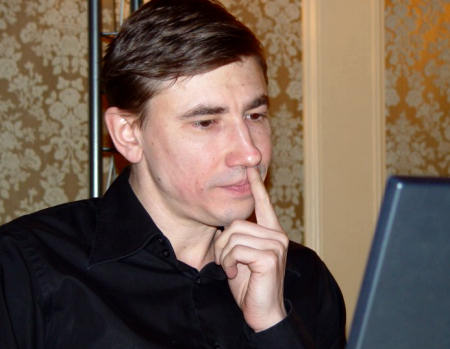



The First Amber Kriegspiel Chess Tournament will take place at the Monte Carlo Grand Hôtel in Monaco from 1st to 13th April 2005. The Dutch billionaire J.J. van Oosterom, a former candidate for the Kriegspiel Chess World Championship, is the exclusive sponsor of this event.
Before we explain Kriegspiel, let us look briefly at the blindfold section, which was played in the first part of the Amber Tournament. It was done using notebook computers. To execute a move the players would click on a square, on an empty chessboard, from which a piece or pawn would move, and then the square to which it should go. The moment they did this the opponent would see the move in full algebraic notation underneath his board, e.g. 1.e2-e4 or 2.Ng1-f3.The only move visible was the last one made. If they tried to execute an impossible move the square would say "illegal move". They were allowed to keep trying until they were able to find a legal move.
The final part of the event is now being played as a Kriegspiel chess tournament. Kriegspiel was introduced at the end of the 19th century and became very popular, even amongst famous chess players like Emanuel Lasker. At that time it was played by two players, but required a third person to act as a referee. Three boards were required for a game.
The main point about Kriegspiel is that players only get to see their own pieces, not those of their opponents. They also do not know what moves the other side has made, so they have to guess where the opponent's pieces are. Only the referee knows exactly the real position of both sets of pieces. The players attempt to make their moves, and the referee tells them whether their moves are legal or not. If an attempted move is not legal the player tries another one, until he has made a legal move. The referee also announces when a move is a capture or checking move.

These days the computer is an ideal referee, and in Monaco the players are able to use the same notebooks they did for their blindfold games. While they can only see their own pieces on the screens, the public in the Grande Hotel playing hall can, of course, see the full position, including the illegal moves the players will frequently attempt to execute.

In the picture above you see the computer screen during the game Leko vs Svidler. Peter Leko can only see his own position and has to conjecture where the pieces of his opponents are.
The first two rounds of the Kriegspiel section of the Amber tournament produced some big upsets. The player who had won the two previous sections in such dominating style, Vishy Anand, suffered two painful losses in the first two Kriegspiel games, and that at the hands of Evgeny Bareev, who was to be found at the bottom end of the blindfold and rapid sections.

Evgeny Bareev, Kriegspiel specialist and favourite for the final leg of
the Amber tournament
Bareev, it turns out, has played a lot of Kriegspiel chess in his late teens and early twenties. In fact he twice won the Russian championship in Kriegspiel. Peter Leko, too, is a bit of an expert (and showed it by defeating Peter Svidler 2-0 in their mini-match). But then again Leko is pretty much an expert in any variant of chess.

Unable to fathom the thoughts of Ivanchuk: Alexei Shirov in his Kriegspiel
game
Alexei Shirov, like Vishy Anand, had some trouble getting used to "conjectural chess", as he calls it. Against Vassily Ivanchuk he lost his first game in a position he was convinced was totally winning.

Boris Gelfand (above) admitted that he was playing the very first Kriegspiel chess games of his life in Monaco. But Boris appears to be a natural talent. He won a very nice game against Veselin Topalov in the early afternoon session, and lost somewhat unluckily in a very promising position in the late evening game.
Here are the results of Friday's sessions, plus the games of round twelve for replay on our JavaScript boards. You can also download them as PGN files. If you replay the games with a chess program it is advisable not to start a chess engine, since its evaluations in this case are quite meaningless. Naturally there are enormous fluctuations in the course of a game, simply because the players are trying to figure out where their opponent's pieces are.
|
|
||||||||||||||||||||||||||||